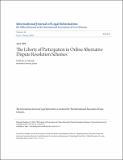|
Reseña:
|
Reseña:Electronic commerce is important, and perhaps, inevitable. Thus toconsider the legal implications of the growth and development of electroniccommerce is essential. However, the lack of suitable dispute resolutionmechanisms in cyberspace will constitute a serious obstacle to the furtherdevelopment of electronic commerce. Bearing this in mind, this paper arguesthat when Alternative Dispute Resolution (ADR) moves to cyberspace,particularly arbitration and mediation as the main types of ADR, the form ofonline alternative dispute resolution (OADR) can maximise the growth of ecommerce.Alternative Dispute Resolution (ADR) and the internet are two verytopical issues. Online alternative dispute resolution (OADR), or ADR online,refers to the use of internet technology, wholly or partially, as a medium bywhich to conduct the proceedings of Alternative Dispute Resolution (ADR), inorder to resolve commercial disputes which arise from the use of the internet.Those proceedings are operated by neutral private bodies under publishedrules of procedure.Having said that, it is important to address mandatory OADR.This means that the parties are bound to adhere to the OADR process. Indeed,it is imperative to display what risks internet users should be willing to takewith mandatory OADR schemes. This paper concludes that the issue ofconsent should be at the forefront of any contemplated OADR solutions.Clearly, it is unacceptable to impose mandatory OADR on internet userswithout their knowledge and consent Instead, a complainant who wishes toElectronic commerce is important, and perhaps, inevitable. Thus toconsider the legal implications of the growth and development of electroniccommerce is essential. However, the lack of suitable dispute resolutionmechanisms in cyberspace will constitute a serious obstacle to the furtherdevelopment of electronic commerce. Bearing this in mind, this paper arguesthat when Alternative Dispute Resolution (ADR) moves to cyberspace,particularly arbitration and mediation as the main types of ADR, the form ofonline alternative dispute resolution (OADR) can maximise the growth of ecommerce. Alternative Dispute Resolution (ADR) and the internet are two verytopical issues. Online alternative dispute resolution (OADR), or ADR online,refers to the use of internet technology, wholly or partially, as a medium bywhich to conduct the proceedings of Alternative Dispute Resolution (ADR), inorder to resolve commercial disputes which arise from the use of the internet.Those proceedings are operated by neutral private bodies under publishedrules of procedure. Having said that, it is important to address mandatory OADR.This means that the parties are bound to adhere to the OADR process. Indeed,it is imperative to display what risks internet users should be willing to takewith mandatory OADR schemes. This paper concludes that the issue ofconsent should be at the forefront of any contemplated OADR solutions.Clearly, it is unacceptable to impose mandatory OADR on internet userswithout their knowledge and consent Instead, a complainant who wishes toaction in any court that has a jurisdiction over the dispute. Bearing this inmind, there is a strong reason to believe that mandatory OADR schemeswould not be enforceable in courts, and that the entire scheme of mandatoryOADR might be unworkable. |

